-
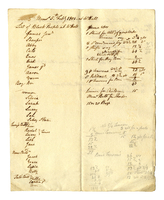 List of Black People at WHall, February 05, 1801
List of Black People at WHall, February 05, 1801 Memo listing enslaved workers of Whitehall, as well as linen and clothing. The list of the enslaved people reads: James Jem
Sharper
Abby
Cato
Enos
Dick
James Jr
Aaron
Yarm
Boy Ben
Women
Sylvia
Sarah
Lucy
Sal
Sukey with Porter
Lucy’s Childr
Phin
Rachel (Twins)
Lucy (Twins)
Tish
Jane
Nans Childr
Jacob
Grace
Lydia
Betty
Sal’s Child
Phillis
Latitia Jr
Tom
-
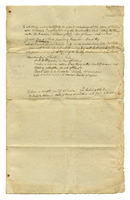 List of enslaved people at Whitehall, n.d.
List of enslaved people at Whitehall, n.d. Undated document listing the enslaved people at Whitehall, as well as measurements. The other side of the document may be a list of some of the Overseer's responsibilities (likely Porter due to the line reading "wife to cut out shirts and womens cloathes if required"). The names and various ages and/or family relations include:
Lemon
James
Sharper
Abby
Enos
Cato
Dick
Aaron
James Jr
Yarm or David
Sylvia
Sarah
Lucy
Latitia
Nan
Jenny
Sal Jr
Sukey
Lucy’s Child - Rachel, Lucy Jr 4 ys old Phil 8 ys, Hannah 7 ys another
Child of Tish – Dol 4 ys Bill 1 yr
Nan’s child – Grace 4 or 5 Jacob 2
Child of Sal Jr – Phillis 3 ys, Latitia Jr 8 mo
Child of Jenny – Bob 1 yr Stephen 6-
-
 List of new clothes for Whitehall's enslaved peoples, 1798 & 1800
List of new clothes for Whitehall's enslaved peoples, 1798 & 1800 The list from January 1798 includes trousers cut for Sharper, Enos, Lemon, Jem Jr., Aaron, and Cato, and petticoats cut for Sylvia, Sarah, Lucy, Letita, Nan, Sal Jr., and Sukey. In May 1800 new trousers were cut for those on the first list, as well as Abby, Dick, James Jr., and Yarm. New petticoats were also cut for Silvia [Sylvia] and Sal. The other side lists "10 yds Linnen for Children" and "Sundry Tools and 25 yds Linnen for ___? of People" in 1798.
-
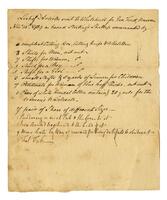 List of Articles sent to Whitehall, November 14, 1789
List of Articles sent to Whitehall, November 14, 1789 List of sundries for Overseer George Ford. The list is mostly composed of clothing for the enslaved workers, including shirts for the men, shifts and petticoats for the women, yards of linen and cotton for children's clothes and the women's waistcoats, and seven pairs of shoes.
-
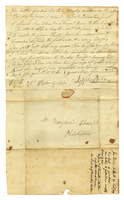 Edward Carney to Benjamin Chew, Jr. regarding the hire of an enslaved girl, April 19, 1800
Edward Carney to Benjamin Chew, Jr. regarding the hire of an enslaved girl, April 19, 1800 Carney advises Chew that he has "been to look at the girl we were talking of and think that she might answer my purpose." Carney and Porter agreed on $80 for her hire.
-
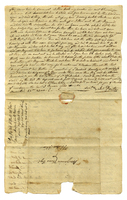 Isaac Davis to Benjamin Chew, Jr. regarding the purchase of Whitehall, January 05, 1803
Isaac Davis to Benjamin Chew, Jr. regarding the purchase of Whitehall, January 05, 1803 Letter expressing interest in the purchase of Whitehall, including the enslaved people. He states that Mr. Porter "Could not Inform the Number of Negroes as the property is Large and Mixed". Davis is asking for the price of the estate as a whole and "the Individual price of the blacks, the Stock & Land..."
-
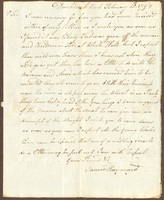 James Raymond to Benjamin Chew, Jr., February 15, 1798
James Raymond to Benjamin Chew, Jr., February 15, 1798 Raymond informs Benjamin Chew Jr. that Ford, the Overseer, left, leaving his wife and children at Whitehall. He also mentions of Aaron being "corrected" after what may have been an altercation between him and Ford. Raymond ends the letter stating that he expects the hiring out the "young blacks...that are of midling size to do a little". Chew's note on the back also states that Ford stole one of their horses.
-
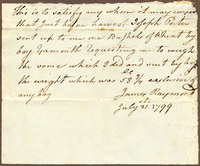 James Raymond's note confirming Yarmouth's delivery of wheat from Whitehall, July 31 1799
James Raymond's note confirming Yarmouth's delivery of wheat from Whitehall, July 31 1799 Note written by James Raymond, possibly giving passage to enslaved man Yarmouth to travel back to Whitehall after having a bushel of wheat weighed by Raymond. The note includes the weight, exclusive of the bag.
-
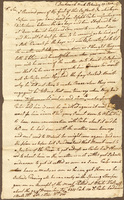 James Raymond to Benjamin Chew about altercations between Whitehall Overseer and enslaved boys, February 19, 1800
James Raymond to Benjamin Chew about altercations between Whitehall Overseer and enslaved boys, February 19, 1800 Information about the altercation between Joseph Porter and two unidentified enslaved boys, learning of it from "Jim" in Dover. Raymond proceeded to Whitehall and believes the two boys should be corrected. There is also information about problems between Merrit and Porter- Porter was furious that Merrit did not try to help make peace. Raymond asked Merrit why he did not assist, and Merrit stated that "Porter told him if he ever medled again it wood be worst for him" [sp]. Merrit had also gone to a Justice of the Peace after Porter threatened to shoot him.
-
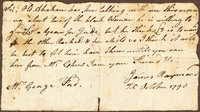 James Raymond to George Ford, October 25, 1790
James Raymond to George Ford, October 25, 1790 Note advising Ford that Old Abraham approached him about hiring Jude and Rachel & her child. Raymond states that Old Abraham is offering $5 a year for Jude, but $3 is too much for Rachel and her child- Raymond proposed Ford speak to Mr. Chew about it and let him have them until it is decided.
-
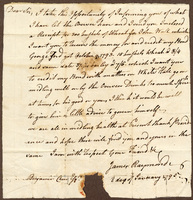 James Raymond to Benjamin Chew, January 08, 1795
James Raymond to Benjamin Chew, January 08, 1795 Letter informing Chew that "matters on White Hall go midling well only the Overseer Drinks too much spirits at time for his good or yours[.] I think it would be well to give him a little advice to govern himself."
-
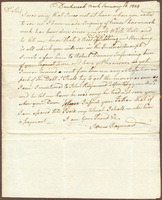 James Raymond to Benjamin Chew, Jr., January 18, 1804
James Raymond to Benjamin Chew, Jr., January 18, 1804 A response to the Chew's inquiry into Prince's work at Whitehall after they have sold it. Raymond advises that "3 Rood of Ditching and Banking is all which you will see in the Inclosed Accompt".
-
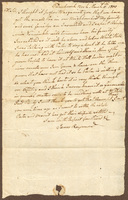 James Raymond to Benjamin Chew regarding smallpox, March 11, 1800
James Raymond to Benjamin Chew regarding smallpox, March 11, 1800 Raymond writes to Chew about smallpox in the area and advises that his family and neighboring families have been innoculated. Porter reported that he was healthy but Jim, Yarm and Lucy have it, as well as "eight or nine small ones". The last line advises that Porter and Merrit have their dispute settled.
-
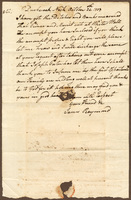 James Raymond to Benjamin Chew, October 24, 1803
James Raymond to Benjamin Chew, October 24, 1803 James Raymond reporting Prince and Merrit's work at Whitehall, stating that he "got the Ditches and Banks measured" that the two men cut. Notes by both Benjamin Chew and Benjamin Chew, Jr. on the back.
-
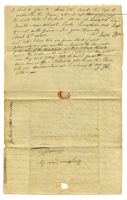 Joseph Porter to Benjamin Chew, c. 1801
Joseph Porter to Benjamin Chew, c. 1801 Porter begins the letter stating "Oar Black Family are still sickly that is Sharper & Dick & Aaron." Mr. Joy refused to hire Lucy because she had a white child and took Ruth instead (the daughter of Big Rachel and Jack) - also mention of Old Sal.
-
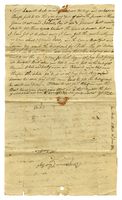 Joseph Porter to Benjamin Chew, June 11, 1801
Joseph Porter to Benjamin Chew, June 11, 1801 The work of the enslaved people is detailed in this letter to Chew. Porter states that they want another woman to help Lucy spin, "for Old Sal is partly givant(?)". Young Lucy (Little Lucy), assumedly back from Dover, is not skilled at spinning and therefore of no help. He goes into detail about Judy, the daughter of Old Sal, who is now living with Prince and Rachel, and states that she is a good wool spinner, and that George Graves has declined buying her. On a similar note, Edward Joy wants a bill of sale for Ruth, for whom he paid $90.
-
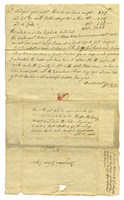 Joseph Porter to Benjamin Chew, May 08, 1804
Joseph Porter to Benjamin Chew, May 08, 1804 The letter begins by adressing "John Gibbs negro"'s interest in hiring Lucy for three years. He offered 30 dollars a year, and he will be charged interest. Beck has also been hired out for $8, to whom and for how long is not clear.
-
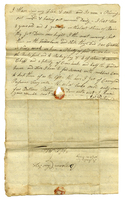 Joseph Porter to Benjamin Chew, April 04, 1801
Joseph Porter to Benjamin Chew, April 04, 1801 Porter advises Chew that the weather has been damp, but Sharper and Jim have been working every day threshing. He is also going to send for Lucy who is currently at Dover.
-
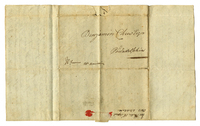 Joseph Porter to Benjamin Chew discussing two enslaved wives and their husbands' financial situations, April 26, 1803
Joseph Porter to Benjamin Chew discussing two enslaved wives and their husbands' financial situations, April 26, 1803 Letter from Porter discussing more monetary issues, including Sam Calhoon being late on his payments for his wife Tisha. He was behind by five dollars, and had another 30 dollars due the next month. George Graves, another Black man, "has given his wife Judy up and says he can never pay for hir[.] He is threatened to be put in jail." After consulting Kennard, Porter is not sure what to do with her, but "she wishes to hear and noe what is to be done with hir." It seems George paid five dollars towards her, and Porter is now deciding whether to hold the money or give it back to him. Also, if Porter should buy her for 60 dollars and asks that he not be held accountable for the other two men's deliquincies. If she is purchased, he wants to hire her for 10 dollars a year for six years, and then "manumate hir to be free" for his new farm in Maryland. He states that George also wished to go to Maryland "and for hir to go with us allso".
-
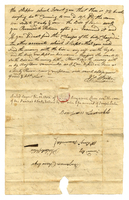 Joseph Porter to Benjamin Chew, August 10, 1803
Joseph Porter to Benjamin Chew, August 10, 1803 Letter from Porter discussing monetary matters. He states that "The Negroes say nothing about paying for their wifes (?)" and that he has gotten "a little from Lea towards Lucys wages but only four dollars". He also mentions payment to the "taylor", in this case his wife, likely for the enslaved people's clothing.
-
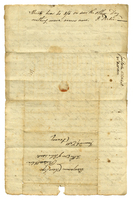 Joseph Porter to Benjamin Chew, October 30, 1802
Joseph Porter to Benjamin Chew, October 30, 1802 Porter discussing the clothing needs of the enslaved people. They are preparing winter wear of "wooling cloathes", including shoes and stockings, and women's suits of wool. The wool itself is in production, part still at the mill and part already at being tailored.
-
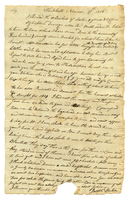 Joseph Porter to Benjamin Chew regarding potential sale of Little Lucy, November 17, 1802
Joseph Porter to Benjamin Chew regarding potential sale of Little Lucy, November 17, 1802 Letter regarding the Mr. Naudain's application to buy Little Lucy, daughter of Old Lucy, to Mr. Naudain. Porter states that she is between eight and nine years old, and "common size to hir age[.] Hir value I have said nothing about to him". He refused the sale, and advises that Naudain will be traveling to Philadelphia soon. Porter also states that the enslaved people have come to him asking for more blankets as "the year for them is corse and they stand in need of them".
-
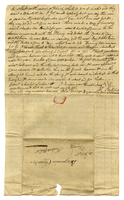 Joseph Porter to Benjamin Chew, December 27, 1802
Joseph Porter to Benjamin Chew, December 27, 1802 Letter detailing the needs of a few enslaved people of Whitehall, first stating that he recieved cloth, followed by an unclear note stating Sukey and Phin "wants each one" and "[name damaged] has hir child and Phene [Phin] has to sleep with Nan's orphans which is 3 or 4 in a bed and they want a blankett too". He addresses food or harvest, including "a bagg of homminy which Sharper has [pounded or bundled] for you". Porter also advises that Aaron is very sick- he was visited by the doctor, Porter bled him, and the doctor visited again.
-
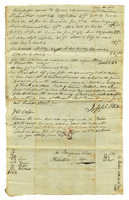 Joseph Porter to Benjamin Chew, May 18, 1799
Joseph Porter to Benjamin Chew, May 18, 1799 Porter describes work done by Old Lemon and provides measurements for Abbas (Abby?), Cato, Enos, Dick, Old Jem, Lemon, Jem Jr, Aaron, Yarm, Sharper, Old Silvy [Silvia], Old Sal, Lucy, Nan, Little Sal, and Sukey. A final note at the end of the letter states that the tailor is owed six dollars for the "Peoples cloath".
-
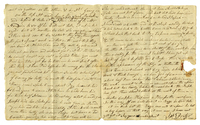 Joseph Porter to Benjamin Chew addressing sale of enslaved woman Peg, November 08, 1800
Joseph Porter to Benjamin Chew addressing sale of enslaved woman Peg, November 08, 1800 Enclosed in this letter was the money that Porter recieved from Carney for Hetty, and states that Carney is requesting a bill of sale for her. Henry Onail (sp?) inquired about Peg, asking if he could hire her for ten years. He replied to Onail that he could have her for ten and a half. A man named Johannes is mentioned, and that "he did not say what he would g__(give?)". Joseph Hill also "spoke for hir" and offered 30 pounds and to take her immediately, though Porter believe she is worth more than Hetty. Porter states that Peg "is some larger but bears a bad caracter [sp]... she is naked allmost she must have shoes and stockings If she are not put of soon woud best let Hill have hir Thirty pounds is as much as can be had I expect."
 List of Black People at WHall, February 05, 1801 Memo listing enslaved workers of Whitehall, as well as linen and clothing. The list of the enslaved people reads: James Jem Sharper Abby Cato Enos Dick James Jr Aaron Yarm Boy Ben Women Sylvia Sarah Lucy Sal Sukey with Porter Lucy’s Childr Phin Rachel (Twins) Lucy (Twins) Tish Jane Nans Childr Jacob Grace Lydia Betty Sal’s Child Phillis Latitia Jr Tom
List of Black People at WHall, February 05, 1801 Memo listing enslaved workers of Whitehall, as well as linen and clothing. The list of the enslaved people reads: James Jem Sharper Abby Cato Enos Dick James Jr Aaron Yarm Boy Ben Women Sylvia Sarah Lucy Sal Sukey with Porter Lucy’s Childr Phin Rachel (Twins) Lucy (Twins) Tish Jane Nans Childr Jacob Grace Lydia Betty Sal’s Child Phillis Latitia Jr Tom List of enslaved people at Whitehall, n.d. Undated document listing the enslaved people at Whitehall, as well as measurements. The other side of the document may be a list of some of the Overseer's responsibilities (likely Porter due to the line reading "wife to cut out shirts and womens cloathes if required"). The names and various ages and/or family relations include: Lemon James Sharper Abby Enos Cato Dick Aaron James Jr Yarm or David Sylvia Sarah Lucy Latitia Nan Jenny Sal Jr Sukey Lucy’s Child - Rachel, Lucy Jr 4 ys old Phil 8 ys, Hannah 7 ys another Child of Tish – Dol 4 ys Bill 1 yr Nan’s child – Grace 4 or 5 Jacob 2 Child of Sal Jr – Phillis 3 ys, Latitia Jr 8 mo Child of Jenny – Bob 1 yr Stephen 6-
List of enslaved people at Whitehall, n.d. Undated document listing the enslaved people at Whitehall, as well as measurements. The other side of the document may be a list of some of the Overseer's responsibilities (likely Porter due to the line reading "wife to cut out shirts and womens cloathes if required"). The names and various ages and/or family relations include: Lemon James Sharper Abby Enos Cato Dick Aaron James Jr Yarm or David Sylvia Sarah Lucy Latitia Nan Jenny Sal Jr Sukey Lucy’s Child - Rachel, Lucy Jr 4 ys old Phil 8 ys, Hannah 7 ys another Child of Tish – Dol 4 ys Bill 1 yr Nan’s child – Grace 4 or 5 Jacob 2 Child of Sal Jr – Phillis 3 ys, Latitia Jr 8 mo Child of Jenny – Bob 1 yr Stephen 6- List of new clothes for Whitehall's enslaved peoples, 1798 & 1800 The list from January 1798 includes trousers cut for Sharper, Enos, Lemon, Jem Jr., Aaron, and Cato, and petticoats cut for Sylvia, Sarah, Lucy, Letita, Nan, Sal Jr., and Sukey. In May 1800 new trousers were cut for those on the first list, as well as Abby, Dick, James Jr., and Yarm. New petticoats were also cut for Silvia [Sylvia] and Sal. The other side lists "10 yds Linnen for Children" and "Sundry Tools and 25 yds Linnen for ___? of People" in 1798.
List of new clothes for Whitehall's enslaved peoples, 1798 & 1800 The list from January 1798 includes trousers cut for Sharper, Enos, Lemon, Jem Jr., Aaron, and Cato, and petticoats cut for Sylvia, Sarah, Lucy, Letita, Nan, Sal Jr., and Sukey. In May 1800 new trousers were cut for those on the first list, as well as Abby, Dick, James Jr., and Yarm. New petticoats were also cut for Silvia [Sylvia] and Sal. The other side lists "10 yds Linnen for Children" and "Sundry Tools and 25 yds Linnen for ___? of People" in 1798. List of Articles sent to Whitehall, November 14, 1789 List of sundries for Overseer George Ford. The list is mostly composed of clothing for the enslaved workers, including shirts for the men, shifts and petticoats for the women, yards of linen and cotton for children's clothes and the women's waistcoats, and seven pairs of shoes.
List of Articles sent to Whitehall, November 14, 1789 List of sundries for Overseer George Ford. The list is mostly composed of clothing for the enslaved workers, including shirts for the men, shifts and petticoats for the women, yards of linen and cotton for children's clothes and the women's waistcoats, and seven pairs of shoes. Edward Carney to Benjamin Chew, Jr. regarding the hire of an enslaved girl, April 19, 1800 Carney advises Chew that he has "been to look at the girl we were talking of and think that she might answer my purpose." Carney and Porter agreed on $80 for her hire.
Edward Carney to Benjamin Chew, Jr. regarding the hire of an enslaved girl, April 19, 1800 Carney advises Chew that he has "been to look at the girl we were talking of and think that she might answer my purpose." Carney and Porter agreed on $80 for her hire. Isaac Davis to Benjamin Chew, Jr. regarding the purchase of Whitehall, January 05, 1803 Letter expressing interest in the purchase of Whitehall, including the enslaved people. He states that Mr. Porter "Could not Inform the Number of Negroes as the property is Large and Mixed". Davis is asking for the price of the estate as a whole and "the Individual price of the blacks, the Stock & Land..."
Isaac Davis to Benjamin Chew, Jr. regarding the purchase of Whitehall, January 05, 1803 Letter expressing interest in the purchase of Whitehall, including the enslaved people. He states that Mr. Porter "Could not Inform the Number of Negroes as the property is Large and Mixed". Davis is asking for the price of the estate as a whole and "the Individual price of the blacks, the Stock & Land..." James Raymond to Benjamin Chew, Jr., February 15, 1798 Raymond informs Benjamin Chew Jr. that Ford, the Overseer, left, leaving his wife and children at Whitehall. He also mentions of Aaron being "corrected" after what may have been an altercation between him and Ford. Raymond ends the letter stating that he expects the hiring out the "young blacks...that are of midling size to do a little". Chew's note on the back also states that Ford stole one of their horses.
James Raymond to Benjamin Chew, Jr., February 15, 1798 Raymond informs Benjamin Chew Jr. that Ford, the Overseer, left, leaving his wife and children at Whitehall. He also mentions of Aaron being "corrected" after what may have been an altercation between him and Ford. Raymond ends the letter stating that he expects the hiring out the "young blacks...that are of midling size to do a little". Chew's note on the back also states that Ford stole one of their horses. James Raymond's note confirming Yarmouth's delivery of wheat from Whitehall, July 31 1799 Note written by James Raymond, possibly giving passage to enslaved man Yarmouth to travel back to Whitehall after having a bushel of wheat weighed by Raymond. The note includes the weight, exclusive of the bag.
James Raymond's note confirming Yarmouth's delivery of wheat from Whitehall, July 31 1799 Note written by James Raymond, possibly giving passage to enslaved man Yarmouth to travel back to Whitehall after having a bushel of wheat weighed by Raymond. The note includes the weight, exclusive of the bag. James Raymond to Benjamin Chew about altercations between Whitehall Overseer and enslaved boys, February 19, 1800 Information about the altercation between Joseph Porter and two unidentified enslaved boys, learning of it from "Jim" in Dover. Raymond proceeded to Whitehall and believes the two boys should be corrected. There is also information about problems between Merrit and Porter- Porter was furious that Merrit did not try to help make peace. Raymond asked Merrit why he did not assist, and Merrit stated that "Porter told him if he ever medled again it wood be worst for him" [sp]. Merrit had also gone to a Justice of the Peace after Porter threatened to shoot him.
James Raymond to Benjamin Chew about altercations between Whitehall Overseer and enslaved boys, February 19, 1800 Information about the altercation between Joseph Porter and two unidentified enslaved boys, learning of it from "Jim" in Dover. Raymond proceeded to Whitehall and believes the two boys should be corrected. There is also information about problems between Merrit and Porter- Porter was furious that Merrit did not try to help make peace. Raymond asked Merrit why he did not assist, and Merrit stated that "Porter told him if he ever medled again it wood be worst for him" [sp]. Merrit had also gone to a Justice of the Peace after Porter threatened to shoot him. James Raymond to George Ford, October 25, 1790 Note advising Ford that Old Abraham approached him about hiring Jude and Rachel & her child. Raymond states that Old Abraham is offering $5 a year for Jude, but $3 is too much for Rachel and her child- Raymond proposed Ford speak to Mr. Chew about it and let him have them until it is decided.
James Raymond to George Ford, October 25, 1790 Note advising Ford that Old Abraham approached him about hiring Jude and Rachel & her child. Raymond states that Old Abraham is offering $5 a year for Jude, but $3 is too much for Rachel and her child- Raymond proposed Ford speak to Mr. Chew about it and let him have them until it is decided. James Raymond to Benjamin Chew, January 08, 1795 Letter informing Chew that "matters on White Hall go midling well only the Overseer Drinks too much spirits at time for his good or yours[.] I think it would be well to give him a little advice to govern himself."
James Raymond to Benjamin Chew, January 08, 1795 Letter informing Chew that "matters on White Hall go midling well only the Overseer Drinks too much spirits at time for his good or yours[.] I think it would be well to give him a little advice to govern himself." James Raymond to Benjamin Chew, Jr., January 18, 1804 A response to the Chew's inquiry into Prince's work at Whitehall after they have sold it. Raymond advises that "3 Rood of Ditching and Banking is all which you will see in the Inclosed Accompt".
James Raymond to Benjamin Chew, Jr., January 18, 1804 A response to the Chew's inquiry into Prince's work at Whitehall after they have sold it. Raymond advises that "3 Rood of Ditching and Banking is all which you will see in the Inclosed Accompt". James Raymond to Benjamin Chew regarding smallpox, March 11, 1800 Raymond writes to Chew about smallpox in the area and advises that his family and neighboring families have been innoculated. Porter reported that he was healthy but Jim, Yarm and Lucy have it, as well as "eight or nine small ones". The last line advises that Porter and Merrit have their dispute settled.
James Raymond to Benjamin Chew regarding smallpox, March 11, 1800 Raymond writes to Chew about smallpox in the area and advises that his family and neighboring families have been innoculated. Porter reported that he was healthy but Jim, Yarm and Lucy have it, as well as "eight or nine small ones". The last line advises that Porter and Merrit have their dispute settled. James Raymond to Benjamin Chew, October 24, 1803 James Raymond reporting Prince and Merrit's work at Whitehall, stating that he "got the Ditches and Banks measured" that the two men cut. Notes by both Benjamin Chew and Benjamin Chew, Jr. on the back.
James Raymond to Benjamin Chew, October 24, 1803 James Raymond reporting Prince and Merrit's work at Whitehall, stating that he "got the Ditches and Banks measured" that the two men cut. Notes by both Benjamin Chew and Benjamin Chew, Jr. on the back. Joseph Porter to Benjamin Chew, c. 1801 Porter begins the letter stating "Oar Black Family are still sickly that is Sharper & Dick & Aaron." Mr. Joy refused to hire Lucy because she had a white child and took Ruth instead (the daughter of Big Rachel and Jack) - also mention of Old Sal.
Joseph Porter to Benjamin Chew, c. 1801 Porter begins the letter stating "Oar Black Family are still sickly that is Sharper & Dick & Aaron." Mr. Joy refused to hire Lucy because she had a white child and took Ruth instead (the daughter of Big Rachel and Jack) - also mention of Old Sal. Joseph Porter to Benjamin Chew, June 11, 1801 The work of the enslaved people is detailed in this letter to Chew. Porter states that they want another woman to help Lucy spin, "for Old Sal is partly givant(?)". Young Lucy (Little Lucy), assumedly back from Dover, is not skilled at spinning and therefore of no help. He goes into detail about Judy, the daughter of Old Sal, who is now living with Prince and Rachel, and states that she is a good wool spinner, and that George Graves has declined buying her. On a similar note, Edward Joy wants a bill of sale for Ruth, for whom he paid $90.
Joseph Porter to Benjamin Chew, June 11, 1801 The work of the enslaved people is detailed in this letter to Chew. Porter states that they want another woman to help Lucy spin, "for Old Sal is partly givant(?)". Young Lucy (Little Lucy), assumedly back from Dover, is not skilled at spinning and therefore of no help. He goes into detail about Judy, the daughter of Old Sal, who is now living with Prince and Rachel, and states that she is a good wool spinner, and that George Graves has declined buying her. On a similar note, Edward Joy wants a bill of sale for Ruth, for whom he paid $90. Joseph Porter to Benjamin Chew, May 08, 1804 The letter begins by adressing "John Gibbs negro"'s interest in hiring Lucy for three years. He offered 30 dollars a year, and he will be charged interest. Beck has also been hired out for $8, to whom and for how long is not clear.
Joseph Porter to Benjamin Chew, May 08, 1804 The letter begins by adressing "John Gibbs negro"'s interest in hiring Lucy for three years. He offered 30 dollars a year, and he will be charged interest. Beck has also been hired out for $8, to whom and for how long is not clear. Joseph Porter to Benjamin Chew, April 04, 1801 Porter advises Chew that the weather has been damp, but Sharper and Jim have been working every day threshing. He is also going to send for Lucy who is currently at Dover.
Joseph Porter to Benjamin Chew, April 04, 1801 Porter advises Chew that the weather has been damp, but Sharper and Jim have been working every day threshing. He is also going to send for Lucy who is currently at Dover. Joseph Porter to Benjamin Chew discussing two enslaved wives and their husbands' financial situations, April 26, 1803 Letter from Porter discussing more monetary issues, including Sam Calhoon being late on his payments for his wife Tisha. He was behind by five dollars, and had another 30 dollars due the next month. George Graves, another Black man, "has given his wife Judy up and says he can never pay for hir[.] He is threatened to be put in jail." After consulting Kennard, Porter is not sure what to do with her, but "she wishes to hear and noe what is to be done with hir." It seems George paid five dollars towards her, and Porter is now deciding whether to hold the money or give it back to him. Also, if Porter should buy her for 60 dollars and asks that he not be held accountable for the other two men's deliquincies. If she is purchased, he wants to hire her for 10 dollars a year for six years, and then "manumate hir to be free" for his new farm in Maryland. He states that George also wished to go to Maryland "and for hir to go with us allso".
Joseph Porter to Benjamin Chew discussing two enslaved wives and their husbands' financial situations, April 26, 1803 Letter from Porter discussing more monetary issues, including Sam Calhoon being late on his payments for his wife Tisha. He was behind by five dollars, and had another 30 dollars due the next month. George Graves, another Black man, "has given his wife Judy up and says he can never pay for hir[.] He is threatened to be put in jail." After consulting Kennard, Porter is not sure what to do with her, but "she wishes to hear and noe what is to be done with hir." It seems George paid five dollars towards her, and Porter is now deciding whether to hold the money or give it back to him. Also, if Porter should buy her for 60 dollars and asks that he not be held accountable for the other two men's deliquincies. If she is purchased, he wants to hire her for 10 dollars a year for six years, and then "manumate hir to be free" for his new farm in Maryland. He states that George also wished to go to Maryland "and for hir to go with us allso". Joseph Porter to Benjamin Chew, August 10, 1803 Letter from Porter discussing monetary matters. He states that "The Negroes say nothing about paying for their wifes (?)" and that he has gotten "a little from Lea towards Lucys wages but only four dollars". He also mentions payment to the "taylor", in this case his wife, likely for the enslaved people's clothing.
Joseph Porter to Benjamin Chew, August 10, 1803 Letter from Porter discussing monetary matters. He states that "The Negroes say nothing about paying for their wifes (?)" and that he has gotten "a little from Lea towards Lucys wages but only four dollars". He also mentions payment to the "taylor", in this case his wife, likely for the enslaved people's clothing. Joseph Porter to Benjamin Chew, October 30, 1802 Porter discussing the clothing needs of the enslaved people. They are preparing winter wear of "wooling cloathes", including shoes and stockings, and women's suits of wool. The wool itself is in production, part still at the mill and part already at being tailored.
Joseph Porter to Benjamin Chew, October 30, 1802 Porter discussing the clothing needs of the enslaved people. They are preparing winter wear of "wooling cloathes", including shoes and stockings, and women's suits of wool. The wool itself is in production, part still at the mill and part already at being tailored. Joseph Porter to Benjamin Chew regarding potential sale of Little Lucy, November 17, 1802 Letter regarding the Mr. Naudain's application to buy Little Lucy, daughter of Old Lucy, to Mr. Naudain. Porter states that she is between eight and nine years old, and "common size to hir age[.] Hir value I have said nothing about to him". He refused the sale, and advises that Naudain will be traveling to Philadelphia soon. Porter also states that the enslaved people have come to him asking for more blankets as "the year for them is corse and they stand in need of them".
Joseph Porter to Benjamin Chew regarding potential sale of Little Lucy, November 17, 1802 Letter regarding the Mr. Naudain's application to buy Little Lucy, daughter of Old Lucy, to Mr. Naudain. Porter states that she is between eight and nine years old, and "common size to hir age[.] Hir value I have said nothing about to him". He refused the sale, and advises that Naudain will be traveling to Philadelphia soon. Porter also states that the enslaved people have come to him asking for more blankets as "the year for them is corse and they stand in need of them". Joseph Porter to Benjamin Chew, December 27, 1802 Letter detailing the needs of a few enslaved people of Whitehall, first stating that he recieved cloth, followed by an unclear note stating Sukey and Phin "wants each one" and "[name damaged] has hir child and Phene [Phin] has to sleep with Nan's orphans which is 3 or 4 in a bed and they want a blankett too". He addresses food or harvest, including "a bagg of homminy which Sharper has [pounded or bundled] for you". Porter also advises that Aaron is very sick- he was visited by the doctor, Porter bled him, and the doctor visited again.
Joseph Porter to Benjamin Chew, December 27, 1802 Letter detailing the needs of a few enslaved people of Whitehall, first stating that he recieved cloth, followed by an unclear note stating Sukey and Phin "wants each one" and "[name damaged] has hir child and Phene [Phin] has to sleep with Nan's orphans which is 3 or 4 in a bed and they want a blankett too". He addresses food or harvest, including "a bagg of homminy which Sharper has [pounded or bundled] for you". Porter also advises that Aaron is very sick- he was visited by the doctor, Porter bled him, and the doctor visited again. Joseph Porter to Benjamin Chew, May 18, 1799 Porter describes work done by Old Lemon and provides measurements for Abbas (Abby?), Cato, Enos, Dick, Old Jem, Lemon, Jem Jr, Aaron, Yarm, Sharper, Old Silvy [Silvia], Old Sal, Lucy, Nan, Little Sal, and Sukey. A final note at the end of the letter states that the tailor is owed six dollars for the "Peoples cloath".
Joseph Porter to Benjamin Chew, May 18, 1799 Porter describes work done by Old Lemon and provides measurements for Abbas (Abby?), Cato, Enos, Dick, Old Jem, Lemon, Jem Jr, Aaron, Yarm, Sharper, Old Silvy [Silvia], Old Sal, Lucy, Nan, Little Sal, and Sukey. A final note at the end of the letter states that the tailor is owed six dollars for the "Peoples cloath". Joseph Porter to Benjamin Chew addressing sale of enslaved woman Peg, November 08, 1800 Enclosed in this letter was the money that Porter recieved from Carney for Hetty, and states that Carney is requesting a bill of sale for her. Henry Onail (sp?) inquired about Peg, asking if he could hire her for ten years. He replied to Onail that he could have her for ten and a half. A man named Johannes is mentioned, and that "he did not say what he would g__(give?)". Joseph Hill also "spoke for hir" and offered 30 pounds and to take her immediately, though Porter believe she is worth more than Hetty. Porter states that Peg "is some larger but bears a bad caracter [sp]... she is naked allmost she must have shoes and stockings If she are not put of soon woud best let Hill have hir Thirty pounds is as much as can be had I expect."
Joseph Porter to Benjamin Chew addressing sale of enslaved woman Peg, November 08, 1800 Enclosed in this letter was the money that Porter recieved from Carney for Hetty, and states that Carney is requesting a bill of sale for her. Henry Onail (sp?) inquired about Peg, asking if he could hire her for ten years. He replied to Onail that he could have her for ten and a half. A man named Johannes is mentioned, and that "he did not say what he would g__(give?)". Joseph Hill also "spoke for hir" and offered 30 pounds and to take her immediately, though Porter believe she is worth more than Hetty. Porter states that Peg "is some larger but bears a bad caracter [sp]... she is naked allmost she must have shoes and stockings If she are not put of soon woud best let Hill have hir Thirty pounds is as much as can be had I expect."